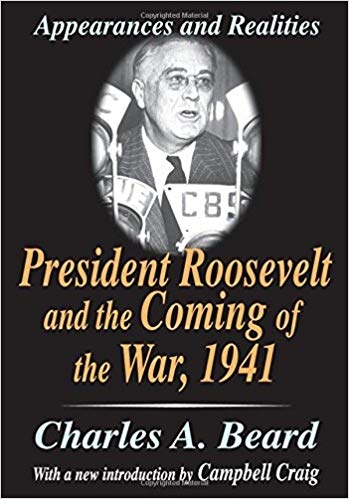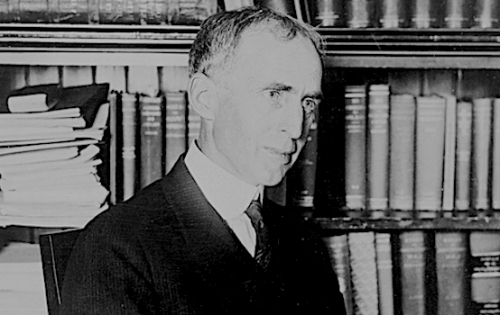Charles Austin Beard: The Return of the Master Historian of American Imperialism is a new book by Richard Drake, himself an accomplished historian who teaches at the University of Montana. Although an estimable study, I can predict with certainty that it won’t be making The New York Times’s bestseller list.
The problem is not with the book, but with its protagonist. Even though today Charles Beard is all but forgotten, he remains a reviled and discredited figure—a supposed emblem of irresponsible scholarship. Yet the story of his rise and fall remains instructive.
For several decades prior to World War II, Beard stood alone at the pinnacle of his profession. As a historian and public intellectual, he was prolific, influential, fiercely independent, and equally adept at writing for scholarly audiences or for the general public. Then in the 1940s, during the last decade of his life, his reputation cratered suddenly, savagely, and irrevocably. Like Bill Cosby or Harvey Weinstein in our own day, almost overnight Beard became a pariah.
Rather than anything as heinous as serial sexual abuse, however, Beard’s offense was to have committed heresy, not once but twice over. Prior to the attack on Pearl Harbor, he opposed U.S. intervention in the European war that had begun in September 1939. And when that conflict ended in 1945 he had the temerity to question the heroic “Good War” narrative that was even then already forming.
Present-day Americans have become so imbued with this narrative as to be oblivious to its existence. Politicians endlessly recount it. Television shows, movies, magazines, and video games affirm it. Members of the public accept it as unquestionably true. From the very moment of its inception, however, Beard believed otherwise and said so in the bluntest terms possible.
For Beard, that narrative echoed a similar line that President Woodrow Wilson had promulgated while justifying U.S. intervention in the prior European war of 1914 to 1918. Back then, the issue at hand, according to Wilson, had been really quite simple: good pitted against evil with freedom, democracy, and prospects of world peace at stake.
Beard had enthusiastically supported Wilson’s war. Only later, especially when reflecting on the terms of the Versailles Treaty, did he develop second thoughts. With many others, Beard soon concluded that the Great War, as it was then called, had never been about freedom and democracy. The actual stakes had related to power, profit, and empire. And rather than advancing the cause of world peace, as Wilson had promised, the war’s outcome merely laid the basis for another bloodletting on an even larger scale.
During the 1920s, Beard began to align himself with the “revisionists”—scholars and journalists who rejected the official line about the origins of the Great War and about why Wilson had abandoned neutrality to fight alongside Great Britain and France. Revisionists disagreed among themselves about many things, but on one point all concurred: on matters related to war, the official story is merely a cover, propaganda concocted for domestic consumption. The purpose of that story is to conceal truth and manipulate popular opinion.
This deep-seated skepticism informed Beard’s perspective on U.S. foreign policy as it evolved after 1933. An early supporter of President Franklin Roosevelt, he recognized that FDR was a supremely gifted politician. Yet he also suspected that the president was a conniving dissembler. When New Deal reforms failed to provide an antidote to the Great Depression, Beard worried that Roosevelt might court trouble abroad. Distracting “giddy minds with foreign quarrels,” as Shakespeare had written in Henry IV, Part 2, offered the prospect of diverting attention from the shortcomings of FDR’s domestic programs.
As Beard saw it, unfolding events confirmed these suspicions. FDR promised peace, yet as the decade progressed, he was maneuvering the United States toward a showdown not only with Nazi Germany but also with the Japanese Empire. In a series of increasingly impassioned books and essays, Beard warned that FDR’s actions were at odds with his words. In the end, his efforts (and those of other anti-interventionists) proved to be of no avail. In December 1941, Roosevelt got the war on two fronts that he had deemed necessary.
 My own judgment is that Roosevelt was right: U.S. entry into what became enshrined as World War II was indeed necessary. Yet by no stretch of the imagination does the result qualify as a “Good War.” And here is where Beard’s critique retains relevance.
My own judgment is that Roosevelt was right: U.S. entry into what became enshrined as World War II was indeed necessary. Yet by no stretch of the imagination does the result qualify as a “Good War.” And here is where Beard’s critique retains relevance.
As Beard pointed out at the time, a war that found the United States allied with Joseph Stalin’s Soviet Union could not possibly be conducive to freedom and democracy, however loosely defined. Stalin was a mass murderer. The Soviet Union was hostile to every value that America purported to represent. No less than Hitler’s Germany, it was a totalitarian enterprise with ambitions to expand its empire.
Furthermore, just as Beard charged, FDR did indeed lie to the American people about the purposes and implications of U.S. policy. Here is Roosevelt campaigning for a third term in Boston on October 30, 1940: “I have said this before, but I shall say it again and again and again: your boys are not going to be sent into any foreign wars.” Even by the standards of Donald Trump, this qualifies as a humongous whopper.
Roosevelt also exceeded his constitutional authority as commander-in-chief, the undeclared war waged by the U.S. Navy against German U-boats operating in the North Atlantic in 1941 offering but one example. While professing a commitment to peace, he also put the squeeze on Japan, confronting that nation with a choice of submission or war. When the Japanese opted for the latter, his administration was neither surprised nor disappointed.
Once the war against the Axis powers was fully engaged, Roosevelt sanctioned massive and indiscriminate bombing campaigns, culminating (after his death) in the use of atomic bombs to destroy Hiroshima and Nagasaki. Not unlike its adversaries, in waging war, the United States had shelved moral considerations. At home, meanwhile, all the chatter about freedom did not prevent America from maintaining a system of de facto racial apartheid and from locking up in concentration camps minorities deemed less than fully loyal.
None of these inconsistencies in the Good War narrative are secret. In the years since, all have been explored, documented, and discussed in detail. For our purposes, however, what matters is this: from a political perspective, none of them count for beans. Donald Rumsfeld might classify them as known knowns we choose to ignore. Yet it’s an inclination we indulge at our peril.
Today the Good War narrative survives fully intact. For politicians and pundits eager to explain why it is incumbent upon the United States to lead or to come to the aid of those yearning to be free, it offers an ever-ready reference point. Casting World War II as a perpetually relevant story of good versus evil relieves Americans of any obligation to consider how the international order may have changed since Hitler inspired Roosevelt, Winston Churchill, and Stalin to forge their unlikely ménage à trois.
In that sense, the persistence of the Good War narrative robs Americans of any capacity to think realistically about their nation’s role in the existing world. Instead, it’s always 1938, with appeasement the ultimate sin to be avoided at all costs. Or it’s 1941, when an innocent nation subjected to a dastardly attack from out of the blue is summoned to embark upon a new crusade to smite the evildoers. Or it’s 1945, with history calling upon the United States to remake the world in its own image. Meanwhile, the crimes, misdemeanors, and miscalculations that U.S. policymakers have racked up then and since end up being filed under the heading of irrelevant.
The charge laid against Beard by those who destroyed his reputation was that he was an “isolationist.” This was a malign distortion of Beard’s actual views, albeit one employed time and again ever since to smear anyone daring as Beard did to challenge the prevailing globalist consensus. The very fact that the smear retains political utility seven decades after World War II is a prime example of how the Good War continues to pervert contemporary foreign policy discourse.
There will be those who say that World War II revisionism inevitably involves anti-Semitism and Holocaust denial. Beard himself disproves this canard, as Richard Drake demonstrates. Beard’s purpose was not to identify scapegoats, but to establish accountability.
Drake’s fine book—itself an exercise in revisionism of the best sort—performs an important service. It invites readers to do what Beard himself strove to do as he kept close watch on events during the 1930s and 1940s: to remain alert to hypocrisy and contradiction contributing to the misuse of American power. In an era awash with fake news, the handiwork not only of policymakers but of the media itself, this task becomes more important than ever.
While World War II may have been necessary, it was not good. It was an epic tragedy from which Americans can learn much with relevance to the present day. But learning assumes a willingness to see beyond myths. Charles Beard shows us where to begin.
Andrew J. Bacevich is The American Conservative‘s writer-at-large. His new book is Twilight of the American Century, published by the University of Notre Dame Press.





 del.icio.us
del.icio.us
 Digg
Digg
Les commentaires sont fermés.